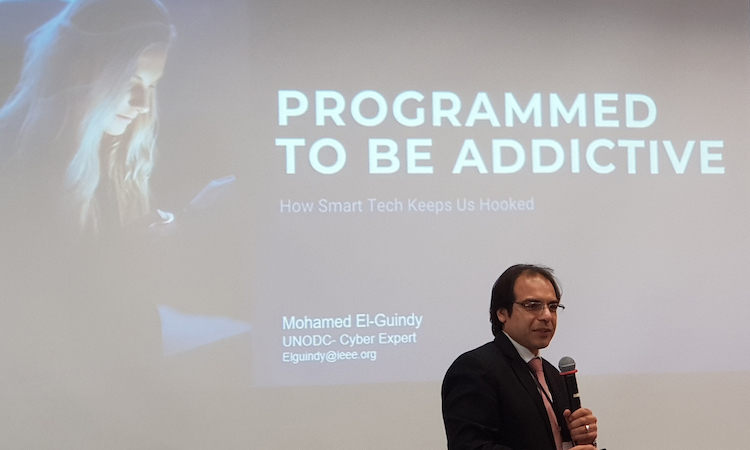By David Robie*
This feature is moved in association with the Pacific Media Centre in New Zealand.
BANGKOK (IDN) – Addressing the annual conference of Asian communication scholars, a leading cyber security expert has called on universities to play a more active role in implementing ethics and legal frameworks for communications smart technology to save society from an Orwellian future.
Dr Mohamed El-Guindy, an Egyptian consultant to the UN Office on Drugs and Crime (UNODC-ROMENA), says communication research programmes should promote “ethically aligned” design.
In an era of “accelerated addictiveness” to smartphone and other digital technologies, he told media researchers, policy advisers and journalists at the 27th Asian Media Information and Communication Centre (AMIC) conference from June 17-19, 2019 at Bangkok’s Chulalongkorn University that it was vital for democracy that universities stepped up.
He also said families and parents needed to be more critically active by balancing screen time and promoting “real social interaction”.
Addressing the “persuasive technologies” industry, Dr El-Guindy spoke about being “hooked”, the “scrolling dopamine loop” and the “digital skinner box” models and how they had made smartphones fill psychological needs.
“Our social fabric is being torn apart,” he said. “As we expect more from technology, we expect less from each other as people. We have suffered a loss of ability to focus without distraction. The result is mental health issues, less empathy and more confusion.”
‘Misinformation, lies’
Dry El-Guindy said societies were engulfed in “misinformation, propaganda and lies”.
He quoted from educator and media theorist Neil Postman’s book Amusing Ourselves to Death: Public Discourse in the Age of Show Business, originally published in 1985 and drawn from a talk reflecting on George Orwell’s 1984.
“Orwell warns that we will be overcome by an externally imposed oppression. But in [Aldous] Huxley’s vision, no Big Brother is required to deprive people of their autonomy, maturity and history. As he saw it, people will come to love their oppression, to ignore the technologies that undo their capacity to think.”
The three-day AMIC conference featured the theme “Are you human? Communication, Technology and New Humanism”.
Manila-based AMIC is the major global organisation focused on Asian media policy and research and publishes two leading journals, the Asian Journal of Communication and Media Asia.
AMIC board chair Professor Crispin Maslog challenged the more than 300 participants to take a more “humanist” approach to communication research and policy building.
“We stand on the brink of a technological revolution that will fundamentally alter the way we live, work, and relate to one another,” he said. “In its scale, scope and complexity, the transformation will be unlike anything humankind has experienced before”.
“As the millennials would say, OMG!”
Among several UNESCO delegates and speakers at the conference, Dorothy Gordon, of the governing board of the UNESCO Institute for Information Technologies in Education, called on participants to lobby through their national commissions and global agencies if they wanted action.
“Asia has the potential to be in control, it can make changes for tech for peace,” she said. “UNESCO is made up of member states. If you want something to happen, you need to lobby your own country first to take up the issue.”
Malaysia’s Dr Azman Azwan Azmawati, an associate professor at the Universiti Sains Malaysia (USM) in Penang and president of the Asian Congress for Media and Communication (ACMC), called for more critical research on patriarchal systems.
“It is crucial for more study of patriarchal systems because of their negative impact on women and stereotyping of women,” she said. “The patriarchal system hinders women from reaching their potential”.
Power imbalance
Professor Mark Pearson of Australia’s Griffith University spoke of human rights advocacy journalism in a global justice context. “Global justice can be a legitimate ethical objective of advocacy journalism, requiring factuality as a platform,” he said. “It is achievable in some cases through a wise and intentional position of ‘advocacy journalism’ which sits comfortably with the professional values of the livelihood of journalists.”
He cited several examples of advocacy journalism in Australia and New Zealand, including Greenpeace investigative journalist Phil Vine.
Dr Pearson, author of The Journalist’s Guide to Media Law, also spoke about “mindful journalism”, a form of journalism with “wisdom and compassion” drawing from elements of secular Buddhist approaches to meditation and ethics.
High tech ‘slavery’
Professor Jack Linchuan Qiu, author of Goodbye iSlave and director of the Chinese University of Hong Kong’s C-Centre for Chinese Media and Comparative Communication Research, gave an inspired address on the impact of modern day “slavery” in the high-tech industries.
Taiwan’s Professor Georgette Wang of the National Chengchow University engaged with the debate about Asian research methodologies, saying that perhaps the right questions were not being asked. She said there was an absence of “East-West dialogue” over research methodologies and there needed to be more engagement.
Blaming globalisation, she said that while the “periphery” had gained greater presence in the international arena, it had also “brought the profile of theories and questions originating in the West to greater prominence”.
Instead of rejecting Western research models in an Asian context, more effort was needed to “develop a new paradigm” drawing on both East-West traditions.
* Professor David Robie is director of the Pacific Media Centre (PMC) at Auckland University of Technology. A version of this article was originally published by the PMC and can be viewed here: https://asiapacificreport.nz/2019/06/22/bring-ethics-into-global-smart-tech-warns-un-cyber-expert/ It is being republished under a Creative Commons licence. [IDN-InDepthNews – 27 June 2019]
Photo: Egyptian professor Dr Mohamed El-Guindy addressing the conference. Credit: David Robie.
SUPPORT US in Speaking Out for People, Planet and Peace.
IDN is flagship agency of the International Press Syndicate.
facebook.com/IDN.GoingDeeper – twitter.com/InDepthNews
Send your comment: comment@indepthnews.colo.ba.be
Subscribe to IDN Newsletter: newsletter@indepthnews.colo.ba.be

